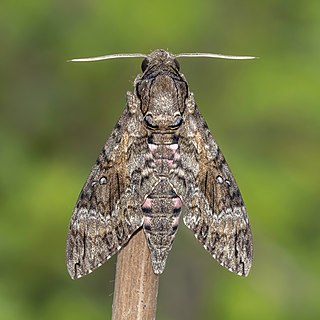Top Qs
Timeline
Chat
Perspective
Agrius cingulata
Species of moth From Wikipedia, the free encyclopedia
Remove ads
Agrius cingulata, the pink-spotted hawkmoth or sweetpotato hornworm, is a moth in the family Sphingidae. The species was first described by Johan Christian Fabricius in 1775.
Remove ads
Description
The imago has a wingspan of 3+3⁄4 to 4+3⁄4 inches (9.5–12 cm). Its robust body is gray brown with pink bands. The abdomen tapers to a point. The hindwings are gray with black bands and pink at the bases.
- Female
- Female underside
- Male
- Male underside
Biology
The imago is nocturnal.[2] It feeds on the nectar from deep-throated flowers including moonflower (Calonyction aculeatum), morning glories (Convolvulus species), and petunias (Petunia species).[3][4]
The larva is a large, stout caterpillar with a horn. It feeds during the day and the night on sweet potato (Ipomoea batatas), Datura species, and other plants. It is known as a pest of sweet potato.[3]
Remove ads
Distribution
This is mainly a neotropical species, and the adults migrate north to Canada and south to Patagonia and the Falkland Islands. It can also be found in the Galápagos Islands and Hawaii. It has been reported from western Europe, including Portugal and the United Kingdom. It has recently become established in West Africa and Cape Verde, possibly having originated in Brazil.[5][6][7]
Gallery
- Adult variation
- Caterpillar
- Proboscis
References
External links
Wikiwand - on
Seamless Wikipedia browsing. On steroids.
Remove ads









